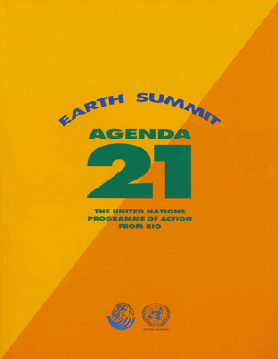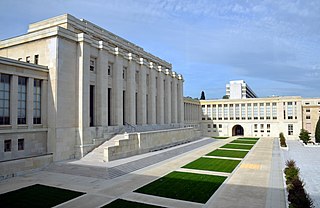The Forest Principles (also Rio Forest Principles, formally the Non-Legally Binding Authoritative Statement of Principles for a Global Consensus on the Management, Conservation and Sustainable Development of All Types of Forests) is a 1992 document produced at the United Nations Conference on Environment and Development (the "Earth Summit"). [1] It is a non-legally binding document that makes several recommendations for conservation and sustainable development forestry.
At the Earth Summit, the negotiation of the document was complicated by demands by developing nations in the Group of 77 for increased foreign aid in order to pay for the setting aside of forest reserves. [2] Developed nations resisted those demands, and the final document was a compromise.
The FOREST EUROPE process (Ministerial Conference on the Protection of Forests in Europe, MCPFE) was started by Strasbourg Conference in 1990 and the Forest Principles were adopted and incorporated into the agenda by Helsinki Conference in 1993. The process covers Pan-European region consisting of 47 signatories (46 European countries and the European Union) that partially overlaps with Montréal Process region (Russia is a signatory of both processes).
As a result of lobbying by the developing country caucus (or Group of 77) in the United Nations, the non-legally binding Forest Principles were established in 1992. These linked the problem of deforestation to third world debt and inadequate technology transfer and stated that the "agreed full incremental cost of achieving benefits associated with forest conservation...should be equitably shared by the international community" (para1(b)). [3] Subsequently, the Group of 77 argued in the 1995 Intergovernmental Panel on Forests (IPF) and then the 2001 Intergovernmental Forum on Forests (IFF), for affordable access to environmentally sound technologies without the stringency of intellectual property rights; while developed states there rejected demands for a forests fund. [4]
The expert group created under the United Nations Forum on Forests (UNFF) reported in 2004, but in 2007 developed nations again vetoed language in the principles of the final text which might confirm their legal responsibility under international law to supply finance and environmentally sound technologies to the developing world. [5]
The Montréal Process, also known as the Working Group on Criteria and Indicators for the Conservation and Sustainable Management of Temperate and Boreal Forests, was started in 1994 as a result of the Forest Principles.

The Convention on Biological Diversity (CBD), known informally as the Biodiversity Convention, is a multilateral treaty. The Convention has three main goals: the conservation of biological diversity ; the sustainable use of its components; and the fair and equitable sharing of benefits arising from genetic resources. Its objective is to develop national strategies for the conservation and sustainable use of biological diversity, and it is often seen as the key document regarding sustainable development.

Environmental law is a collective term encompassing aspects of the law that provide protection to the environment. A related but distinct set of regulatory regimes, now strongly influenced by environmental legal principles, focus on the management of specific natural resources, such as forests, minerals, or fisheries. Other areas, such as environmental impact assessment, may not fit neatly into either category, but are nonetheless important components of environmental law.

Agenda 21 is a non-binding action plan of the United Nations with regard to sustainable development. It is a product of the Earth Summit held in Rio de Janeiro, Brazil, in 1992. It is an action agenda for the UN, other multilateral organizations, and individual governments around the world that can be executed at local, national, and global levels. One major objective of the Agenda 21 initiative is that every local government should draw its own local Agenda 21. Its aim initially was to achieve global sustainable development by 2000, with the "21" in Agenda 21 referring to the original target of the 21st century.

The United Nations Conference on Environment and Development (UNCED), also known as the RioConference or the Earth Summit, was a major United Nations conference held in Rio de Janeiro from June 3 to June 14, 1992.

Illegal logging is the harvest, transportation, purchase, or sale of timber in violation of laws. The harvesting procedure itself may be illegal, including using corrupt means to gain access to forests; extraction without permission, or from a protected area; the cutting down of protected species; or the extraction of timber in excess of agreed limits. Illegal logging is a driving force for a number of environmental issues such as deforestation, soil erosion and biodiversity loss which can drive larger-scale environmental crises such as climate change and other forms of environmental degradation.

Forestry laws govern activities in designated forest lands, most commonly with respect to forest management and timber harvesting. Forestry laws generally adopt management policies for public forest resources, such as multiple use and sustained yield. Forest management is split between private and public management, with public forests being sovereign property of the State. Forestry laws are now considered an international affair.

Sustainable forest management (SFM) is the management of forests according to the principles of sustainable development. Sustainable forest management has to keep the balance between three main pillars: ecological, economic and socio-cultural. Sustainable forestry can seem contradicting to some individuals as the act of logging trees is not sustainable. However, the goal of sustainable forestry is to allow for a balance to be found between ethical forestry and maintaining biodiversity through the means of maintaining natural patterns of disturbance and regeneration. The forestry industry mitigates climate change by boosting carbon storage in growing trees and soils and improving the sustainable supply of renewable raw materials via sustainable forest management. Successfully achieving sustainable forest management will provide integrated benefits to all, ranging from safeguarding local livelihoods to protecting biodiversity and ecosystems provided by forests, reducing rural poverty and mitigating some of the effects of climate change. Forest conservation is essential to stop climate change.

The United Nations Forum on Forests (UNFF) is a high-level intergovernmental policy forum. The forum includes all United Nations member states and permanent observers, the UNFF Secretariat, the Collaborative Partnership on Forests, Regional Organizations and Processes and Major Groups.

The United Nations Department of Economic and Social Affairs is part of the United Nations Secretariat and is responsible for the follow-up to major United Nations Summits and Conferences, as well as services to the United Nations Economic and Social Council and the Second and Third Committees of the United Nations General Assembly. UN DESA assists countries around the world in agenda-setting and decision-making with the goal of meeting their economic, social and environmental challenges. It supports international cooperation to promote sustainable development for all, having as a foundation the 2030 Agenda for Sustainable Development and the 17 Sustainable Development Goals (SDGs) as adopted by the UN General Assembly on 25 September 2015. In providing a broad range of analytical products, policy advice, and technical assistance, UN DESA effectively translates global commitments in the economic, social and environmental spheres into national policies and actions and continues to play a key role in monitoring progress towards internationally agreed-upon development goals. It is also a member of the United Nations Development Group.
Principles for Responsible Investment is a United Nations-supported international network of financial institutions working together to implement its six aspirational principles, often referenced as "the Principles". Its goal is to understand the implications of sustainability for investors and support signatories to facilitate incorporating these issues into their investment decision-making and ownership practices. In implementing these principles, signatories contribute to the development of a more sustainable global financial system.

An international organization or international organisation, also known as an intergovernmental organization or an international institution, is a stable set of norms and rules meant to govern the behavior of states and other actors in the international system. Organizations may be established by a treaty or be an instrument governed by international law and possessing its own legal personality, such as the United Nations, the World Health Organization and NATO. International organizations are composed of primarily member states, but may also include other entities, such as other international organizations, firms, and nongovernmental organizations. Additionally, entities may hold observer status.
In political ecology and environmental policy, climate governance is the diplomacy, mechanisms and response measures "aimed at steering social systems towards preventing, mitigating or adapting to the risks posed by climate change". A definitive interpretation is complicated by the wide range of political and social science traditions that are engaged in conceiving and analysing climate governance at different levels and across different arenas. In academia, climate governance has become the concern of geographers, anthropologists, economists and business studies scholars.
The United Nations Collaborative Programme on "Reducing emissions from deforestation and forest degradation and the role of conservation, sustainable management of forests and enhancement of forest carbon stocks in developing countries (REDD+)" was first negotiated under the United Nations Framework Convention on Climate Change (UNFCCC) in 2005, with the objective of mitigating climate change through reducing net emissions of greenhouse gases through enhanced forest management in developing countries. Most of the key REDD+ decisions were completed by 2013, with the final pieces of the rulebook finished in 2015.
The United Nations Guidelines for Consumer Protection (UNGCP) relate to consumer protection goals. The statement supplied is that the guidelines are "a valuable set of principles for setting out the main characteristics of effective consumer protection legislation, enforcement institutions and redress systems and for assisting interested Member States in formulating and enforcing domestic and regional laws, rules and regulations that are suitable to their own economic and social and environmental circumstances, as well as promoting international enforcement cooperation among Member States and encouraging the sharing of experiences in consumer protection."
The Montréal Process, officially known as the Montréal Process Working Group on Criteria and Indicators for the Conservation and Sustainable Management of Temperate and Boreal Forests, is a voluntary agreement on sustainable forest management. It was formed in Geneva, Switzerland in June 1994 as a result of the Rio Forest Principles developed at the 1992 Earth Summit.
Multistakeholder governance is a practice of governance that employs bringing multiple stakeholders together to participate in dialogue, decision making, and implementation of responses to jointly perceived problems. The principle behind such a structure is that if enough input is provided by multiple types of actors involved in a question, the eventual consensual decision gains more legitimacy, and can be more effectively implemented than a traditional state-based response. While the evolution of multistakeholder governance is occurring principally at the international level, public-private partnerships (PPPs) are domestic analogues.

The Ministerial Conference on the Protection of Forests in Europe is a pan-European ministerial level voluntary political process for the promotion of sustainable management of European forests.
Criteria & Indicators of Sustainable Forest Management (C&I) are policy instruments by which sustainability of forest management in the country/region, or progress towards Sustainable forest management (SFM), may be evaluated and reported on. C&I is a conjunctive term for a set of objectives and the variables/descriptions allowing to evaluate whether the objectives are achieved or not.

Established in 1992, the Major Group for Children and Youth is the United Nations General Assembly mandated, official, formal and self-organised space for children and youth to contribute to and engage in certain intergovernmental and allied policy processes at the United Nations.
The Commission on Genetic Resources for Food and Agriculture of the Food and Agriculture Organization of the United Nations (FAO) is an intergovernmental body that addresses issues specifically related to the management of biodiversity of relevance to food and agriculture. It was established in 1983 as the Commission on Plant Genetic Resources for Food and Agriculture. In 1995, the mandate of the Commission was extended to cover all components of biodiversity for food and agriculture and its name was changed to its current version. Its membership comprises 178 countries and the European Union.